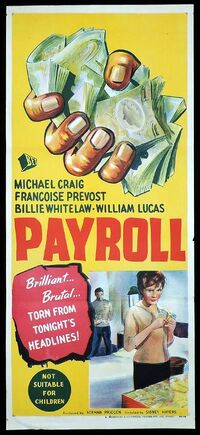Payroll: Difference between revisions
(Created page with "Category:Influences on Morrissey - Film and Television == Relevance == Mentioned in Autobiography: <blockquote> </blockquote> {{Page |DiscogsArtistId= |WikipediaPageTitle=Payroll_(film) }}") |
No edit summary |
||
| (2 intermediate revisions by the same user not shown) | |||
| Line 1: | Line 1: | ||
[[Category:Influences on Morrissey - Film and Television]] | [[Category:Influences on Morrissey - Film and Television]] | ||
[[File:Payroll film poster.jpg | 200px | right | thumb |Payroll film poster]] | |||
== Relevance == | == Relevance == | ||
Mentioned in [[Autobiography]]: | Mentioned in [[Mention::Autobiography]] when describing Johnny Marr: | ||
<blockquote> | <blockquote> | ||
"In 1982, Johnny appears at Kings Road immaculately be-quiffed and almost carried away by his own zest to make meaningful music. He reminds me of Tom Bell in Payroll, an early 1960s film set in Newcastle yet minus one single Geordie accent. Johnny despairs of things as they are and wants to change them, even if, beneath the grit and growl, his favorite group of all-time is Pentangle." | |||
</blockquote> | </blockquote> | ||
{{Page | {{Page | ||
Latest revision as of 16:07, 21 February 2023
Relevance
Mentioned in Autobiography when describing Johnny Marr:
"In 1982, Johnny appears at Kings Road immaculately be-quiffed and almost carried away by his own zest to make meaningful music. He reminds me of Tom Bell in Payroll, an early 1960s film set in Newcastle yet minus one single Geordie accent. Johnny despairs of things as they are and wants to change them, even if, beneath the grit and growl, his favorite group of all-time is Pentangle."
Wikipedia Information
 |
Payroll is a 1961 British neo-noir crime thriller film directed by Sidney Hayers and starring Michael Craig, Françoise Prévost, and Billie Whitelaw. The screenplay by George Baxt was adapted from Derek Bickerton's 1959 novel of the same name. The film revolves around a group of criminals who plan and execute a wages robbery, which ultimately ends in disaster.
